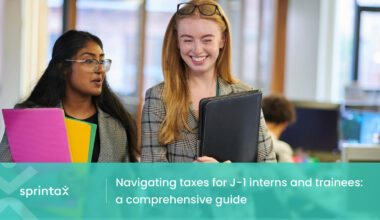The 2024 Paris Olympics has seen a remarkable participation of current, former, and incoming NCAA student-athletes, with many of whom are past and present international students studying in the US.
Over 1,200 athletes, representing 251 NCAA institutions and nearly 60 conferences, are competing, and while the majority of these athletes are part of Team USA, significant numbers also represent countries like Canada, Australia, Nigeria, Jamaica, and Germany, among many others.
Olympic fever has truly taken over in Sprintax HQ! So, as we watched the countless nonresident athletes secure their places in the history books this week, we couldn’t help but ask ourselves:
I wonder what their US tax filing obligations might be?
Surely, we aren’t the only ones?!
Well fear not! In this blog, we’re going to take a deep dive into the tax profiles of some of the most promising student athletes, turned Olympians from this year’s events.
It’s the Olympic coverage you didn’t know you needed!
It’s of no surprise that US universities have offered notable contributions to the Olympic roster.
According to the University Herald, here are some key highlights:
- University of Southern California: 59 athletes
- Stanford University: 54 athletes
- University of California, Berkeley: 41 athletes
- University of Michigan: 41 athletes
- University of Florida: 40 athletes.
In terms of sports, track and field/cross country has the highest representation with 406 athletes, followed by swimming with 223 athletes, and basketball with 150 athletes.
These figures are made up of athletes from around the world, many of whom are classified as nonresidents for tax purposes.

Tax obligations for foreign students
Just like you, foreign Olympians who are studying in the US will also have specific tax obligations, depending on their personal circumstances!
This includes filing both federal and state tax returns. Here’s a breakdown:
Federal tax obligations
Nonresident Status: Most international students on F-1 visas are considered nonresidents for tax purposes.
Form 1040-NR: This form is used to report US-sourced income.
Form 8843: This form will need to be completed even if there was no income earned.
Income Types: Scholarship income, stipends, and any earnings from US sources need to be reported.
State tax returns
Students must file state tax returns in the state where their university is located. Tax rates and rules vary depending on the state.
While some states don’t apply additional state tax, it’s important to familiarize yourself with your obligations.
Tax Treaties
The US has tax treaties with several countries that can provide exemptions or reduced tax rates on certain types of income.
Common countries with tax treaties beneficial for students include China, India, and Germany, but the US has treaties with over 60 countries!
Each treaty has specific provisions, so it’s crucial to review the details relevant to your home country.

Are nonresident Olympians required to file tax documents?
Yes!
Every single nonresident in the US (including an Olympian!) is required to file tax documents before the tax deadline.
If you earned income during the tax year, you must file a federal tax return.
You may also need to file a state tax return.
Furthermore, even if you didn’t receive income, you are still obliged to file a form 8843.
Name, image, and likeness (NIL) and how it affects international student athletes
In 2021, the NCAA changed some of their rules around allowing athletes to compete within their competitions and to make money from certain business ventures, without losing their eligibility to compete.
So, while nonresident student athletes still cannot accept ‘pay for play’ income, the rules have at least changed to enable athletes to sell their name, image and likeness (NIL) rights to earn income.
NIL can include anything from money, gifts (clothing, watches, jewelry or other products), or free meals, which are transferred from an organization to an athlete in exchange for product endorsement.
However, if you are a nonresident collegiate athlete, it may be best to proceed with caution and due diligence. Accepting these payments might just be in breach of your visa conditions.
You can find out more about the NIL rules at this blog post.
F-1 Students and income
If you are an international student athlete on an F-1 visa, it’s likely that you were granted entry into the US in order to pursue educational and athletic opportunities.
So, while F-1 visa holders are entitled to take up a job of either 20 hours of part-time work per week during the semester or 40 hours of full-time work outside the college year (or an OPT program after graduation) which relates to their field of study, the F-1 visa is not generally granted for work purposes. Therefore, collegiate nonresident athletes should be careful not to pursue ‘work’ which is strictly not allowed under the conditions of their visa.
2024 Olympians Case Studies
Case Study #1*
Name: Leon Marchand
Institution: Arizona State
Nationality: French
Age: 22
Event: Men’s Swimming
Tax Considerations: Marchand might benefit from the US-France tax treaty, which could exempt certain scholarship income from US taxation. Needs to file Form 1040-NR and possibly an Arizona state tax return, reporting any US income and claiming treaty benefits.
View this post on Instagram
Case study #2*
Name: Rhasidat Adekele
Institution: University of Texas, Austin
Nationality: Irish
Event: Women’s 400m Sprint
Tax Considerations: Adekele may benefit from the US-Ireland tax treaty. Must file both federal and Texas state tax returns, taking advantage of treaty provisions such as avoiding double taxation.
View this post on Instagram
Case study #3*
Name: Vivian Kong
Institution: Stanford
Nationality: Hong Kong
Event: Women’s Fencing
Tax Considerations: The US and Hong Kong do not have a bilateral tax treaty. Therefore, the general IRS tax and reporting rules apply to students like Kong. If Kong earned income during her stay, she will need to file Form 1040-NR, or 8843 if no income was earned.
View this post on Instagram
Case study #4*
Name: Lisa Tertsch
Institution: Harvard
Nationality: German
Event: Triathlon Mixed Relay
Tax Considerations: The US and Germany have a tax treaty in effect since 1990. The aim is to avoid double taxation of income earned by a citizen or resident Germany such as Tertsch. As a nonresident, Tertsch will have to file Form 1040-NR or 8843 if she did not earn any income.
View this post on Instagram
Case study #5*
Name: Hubert Kos
Institution: Arizona State University
Nationality: Hungarian
Event: Men’s 200m Backstroke
Tax Considerations: The US and Hungary had a tax treaty that was terminated in early 2023. That means that following this date, Hungarian residents in the US are taxed in the US at the regular rate as well as 15% income tax in Hungary (90% of the US tax can be deducted). Students like Kos will need to file a 1040-NR for any income earned.
View this post on Instagram
*DISCLAIMER: These tax profiles are based on the information available to us. They are, of course, only an estimate and to fully understand the extent of someone’s tax liability we would need more information such as their entry/exit dates, visa status in order to perform the Substantial Presence Test to determine residency, and more*
What happens if athletes ignore their tax responsibilities?
With great power comes great responsibility!
As the Olympics winds to a close and athletes are returning home to newfound fame and medals in tow, new opportunities by way of sponsorship might be on the horizon.
Unfortunately for international students in The States – this comes with additional tax considerations.
And remember, the IRS views us all through the same lens, so there will be no preferential treatment if tax obligations are ignored!
Ignoring your tax responsibilities can have serious consequences down the line.
From fines and penalties to future Green Card and visa obligations, why let something like tax get in the way?!
How Sprintax can help international student athletes
Sprintax offers the only online solution for nonresident federal tax e-filing and state tax return preparation.
When tax season rolls around, Sprintax Returns will be on hand to help you prepare every tax document you need, such as your 1040-NR or your state tax return.
Why file with Sprintax?
Put simply, we offer a streamlined federal E-Filing & state tax return preparation for nonresidents, all in one place.
We are the official nonresident tax-filing partner of TurboTax. Remember, you cannot use TurboTax as a nonresident.
When you use our service, not only will you have IRS tax compliance guaranteed, but you will also receive your maximum tax refund due!
Get started with your nonresident alien tax return here.








